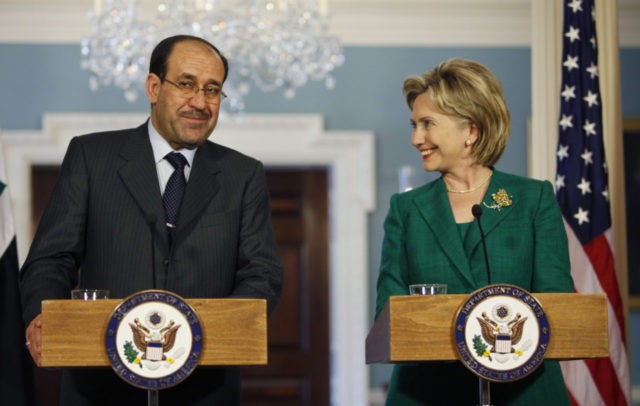As ISIS formed in Iraq, then-Secretary of State Hillary Clinton slashed State Department “eyes and ears on the ground”, as reported in a co-published piece by ProPublica’s Jeff Gerth and the Washington Post’s Joby Warrick.
From ProPublica:
‘A Strategic Vacuum’
Current and former Obama administration officials, including some who sparred with the State Department over Iraq policy, defend Clinton as one of the most vocal advocates for a muscular U.S. presence in Iraq after the withdrawal deadline. Clinton argued publicly and privately for keeping a contingent of U.S. troops in Iraq after Dec. 31, 2011, and when that effort failed, she lobbied the White House and Congress for money to fund civilian-run security programs in Iraq, her former aides said. In written memos and in meetings as part of the president’s national security team, she questioned Maliki’s ability to keep the country united and warned that instability could lead to a resurgence of al-Qaida in Iraq, or AQI, the terrorist group that later renamed itself the Islamic State, the officials said.
“She was seized with this,” recalled Deputy Secretary of State Antony J. Blinken, who was national security adviser to Vice President Biden and then deputy national security adviser to President Obama during key discussions about Iraq policy. “She recognized that AQI was down but not out, and pressed the Iraqis, and us, to keep taking the fight to them.”
But, in scaling back civilian assistance to Iraq, Clinton’s aides cut aggressively and sometimes unwisely, internal auditors later concluded. The reductions met cost-cutting goals but did not “fully consider U.S. foreign policy priorities in Iraq,” an internal review by the State Department’s inspector general said. Some of the cuts were not fully implemented until after Clinton’s departure in early 2013, though the plans were largely in place, former aides said. The report is silent on Clinton’s role in the reductions, or views about them.
Read the rest of the article here.

COMMENTS
Please let us know if you're having issues with commenting.